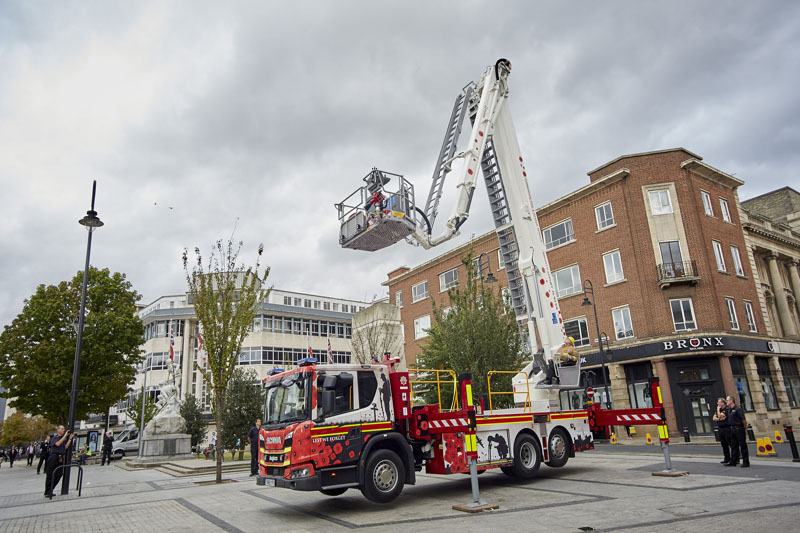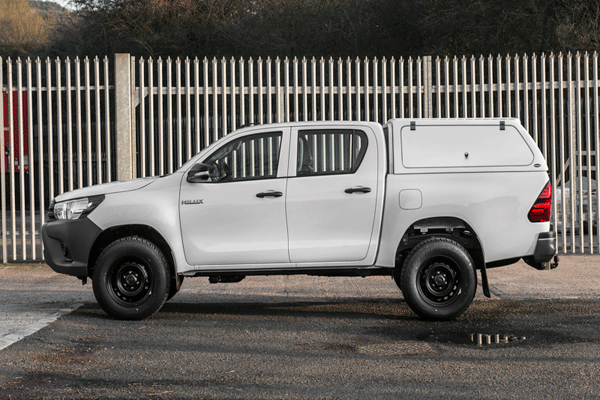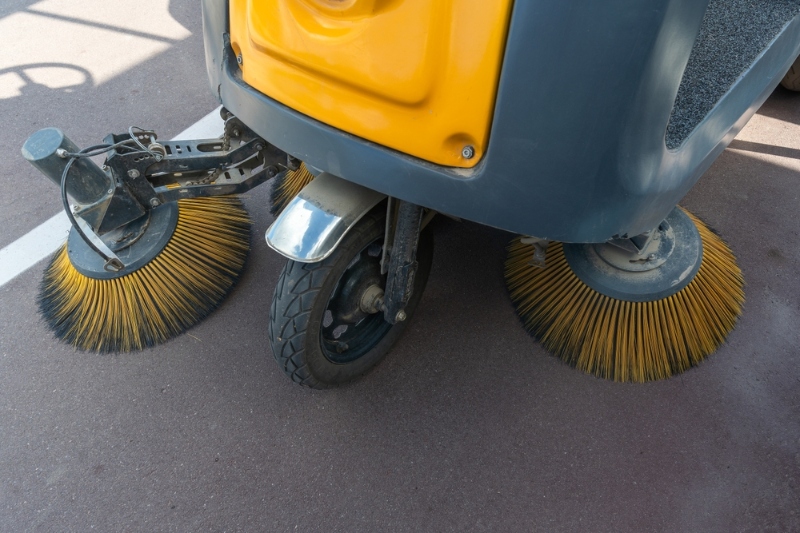Exeter City Council welcomes the delivery of its new fleet as part of a new 7-year fleet contract hire agreement with Specialist Fleet Services (SFS).
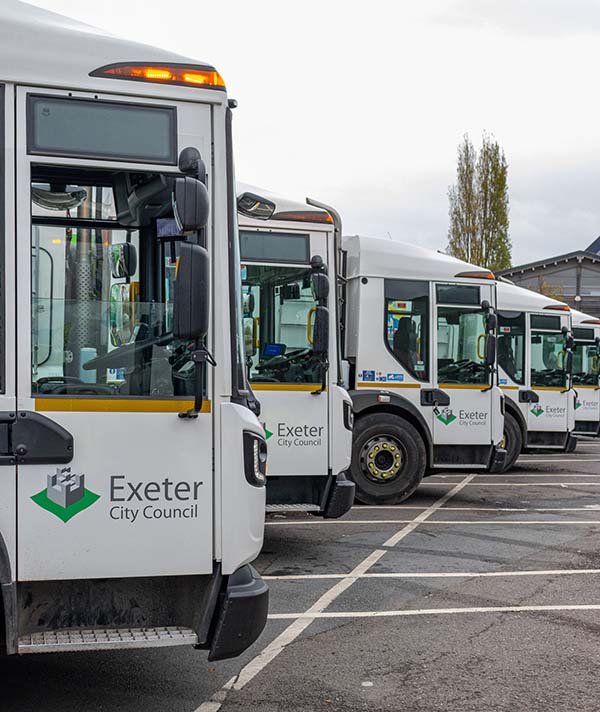
The contract encompasses the provision and maintenance of approximately 210 vehicles ranging from 26-tonne RCVs, sweepers, hook loaders, and tippers to vans, cars, telehandlers and grounds maintenance equipment. The new fleet also includes several electric vehicles. The council has also taken delivery of a Kramer telehandler and a Hako compact sweeper.
The RCVs are all Elite 6x2 narrow rear steer with Olympus 16 bodies and Terberg’s OmniDEL Electric bin lifts. The trucks are fitted with reverse radar and 360-degree camera systems with cyclist detection and warning technology, and auto-braking systems from Vision Techniques.
Simon Hill, Service Manager – Recycling, Waste and Fleet, Exeter City Council said: 'The contract with SFS is enabling us to speed up the replacement of our older vehicles and introduce the latest models, which have a higher level of emission control and have the latest safety technology. SFS has also provided us with more electric vans and cars, so we now have over a dozen electric vehicles on our fleet. In the future, when the technology is properly tried and tested, we hope to be able to introduce electric RCVs to the fleet.'
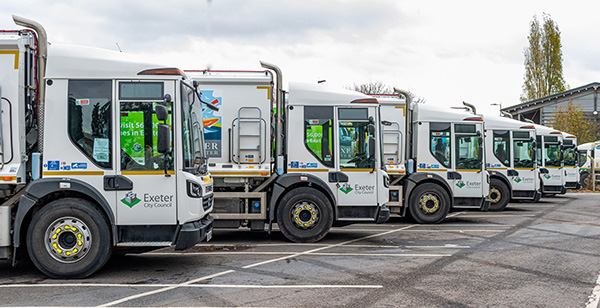
Bob Sweetland, Managing Director, SFS commented: 'These vehicles will not only enhance the efficiency of collections across Exeter, but they are also cleaner and safer. We will be delivering further vehicles over the term of the contract as existing vehicles are due for replacement.'
Exeter City Council, which uses the Bartec Auto-ID system to schedule and manage commercial waste collections, has fitted bin-weighing equipment to five of the new RCVs. It will enable the authority to analyse each collection, plan rounds more efficiently and determine costs more accurately. The weighing equipment is a particularly helpful tool for managing the manual handling of heavy bins, monitoring crews' workloads and alleviating the risk of injury.
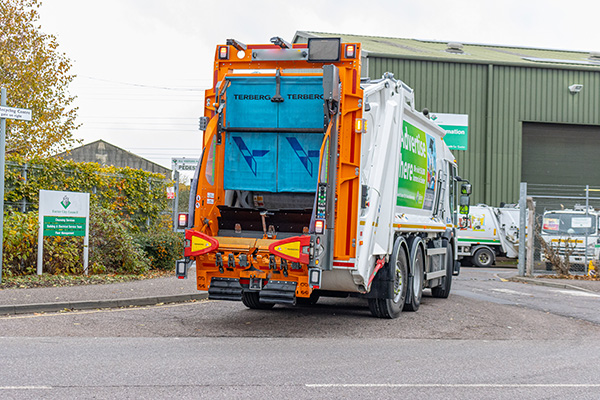
Simon Hill added: 'We've been using Bartec for a few years to help us organise collection rounds and track progress, but the bin-weighing adds a vital layer of measurement to help us protect our staff, analyse costs in more detail and inform our commercial pricing strategy.'
But the vehicles with bin-weighing technology have a dual purpose: to give Exeter a clear understanding of its existing commercial waste collections so that it can improve efficiency and also to future proof the fleet with changes to waste collection and recycling on the horizon.
'We charge a basic rate per bin at the moment, but the bin weighing system will give us a clearer idea of the costs. We’re not considering charging by weight, but we would initially like to identify customers with bins which are consistently too heavy so we can look for other solutions.
'Another development bin weighing will help us undertake is the tracking of manual handling issues. If we know where and when bins are likely to be heavier, we can manage our resources more efficiently. For instance, garden waste is a very seasonal collection and at times can be very heavy.
'Another positive for our commercial customers - is being able to tell them what happens to their waste. And that is something increasing numbers of them want to know. For instance, we’ve just won a new contract with Exeter University, which is keen to know how much waste we are collecting in different streams.
'This will help the University understand how good it is at recycling and where it can improve. Many organisations take this very seriously. It has developed from being a feather in the cap to being an ethical responsibility that is expected.
'Bin weighing will help us inform such customers and also understand our strengths and weaknesses. Two of these vehicles will be assigned to trade waste collections, but the other three with bin-weighing technology will be available for use elsewhere. They could help us look at how different parts of the city are participating in all aspects of recycling.'
'The Dennis Eagle trucks are all narrow because it helps in the tight streets we have in this old city, and there is a lot of reversing to do,' added Simon.
“The OmniDEL bin lifts are all-electric as it cuts down on our emissions and also reduces noise levels, things we’re keen to address. And by having all the trucks as standard - a ‘one-truck-fits-all’ approach - it makes them easier to manage and maintain. It works for us.'



